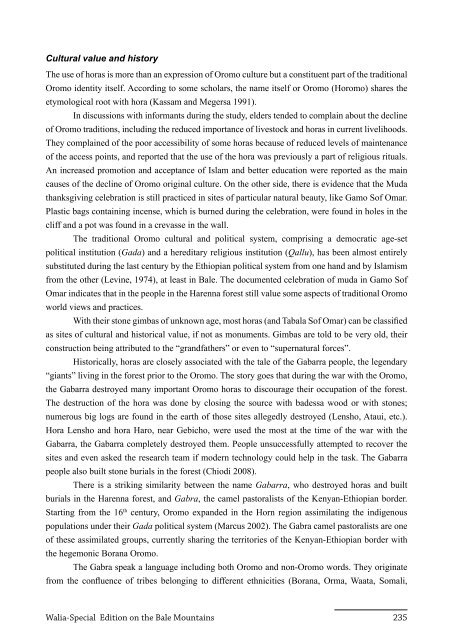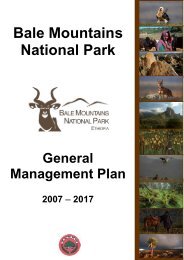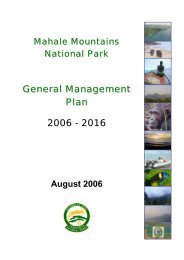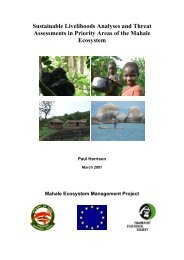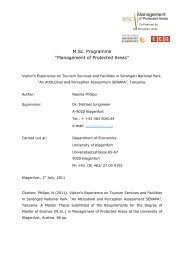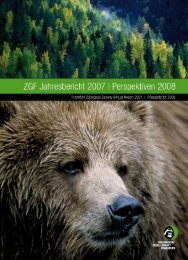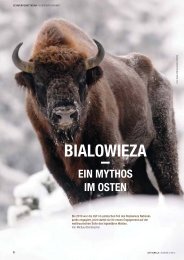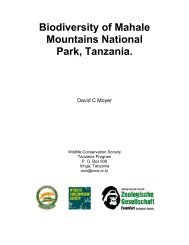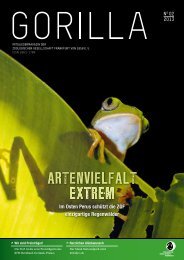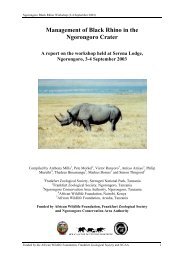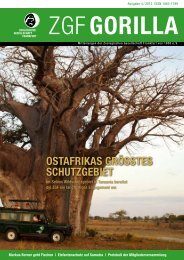Walia Special Edition on the Bale Mountains (2011) - Zoologische ...
Walia Special Edition on the Bale Mountains (2011) - Zoologische ...
Walia Special Edition on the Bale Mountains (2011) - Zoologische ...
You also want an ePaper? Increase the reach of your titles
YUMPU automatically turns print PDFs into web optimized ePapers that Google loves.
Cultural value and history<br />
The use of horas is more than an expressi<strong>on</strong> of Oromo culture but a c<strong>on</strong>stituent part of <strong>the</strong> traditi<strong>on</strong>al<br />
Oromo identity itself. According to some scholars, <strong>the</strong> name itself or Oromo (Horomo) shares <strong>the</strong><br />
etymological root with hora (Kassam and Megersa 1991).<br />
In discussi<strong>on</strong>s with informants during <strong>the</strong> study, elders tended to complain about <strong>the</strong> decline<br />
of Oromo traditi<strong>on</strong>s, including <strong>the</strong> reduced importance of livestock and horas in current livelihoods.<br />
They complained of <strong>the</strong> poor accessibility of some horas because of reduced levels of maintenance<br />
of <strong>the</strong> access points, and reported that <strong>the</strong> use of <strong>the</strong> hora was previously a part of religious rituals.<br />
An increased promoti<strong>on</strong> and acceptance of Islam and better educati<strong>on</strong> were reported as <strong>the</strong> main<br />
causes of <strong>the</strong> decline of Oromo original culture. On <strong>the</strong> o<strong>the</strong>r side, <strong>the</strong>re is evidence that <strong>the</strong> Muda<br />
thanksgiving celebrati<strong>on</strong> is still practiced in sites of particular natural beauty, like Gamo Sof Omar.<br />
Plastic bags c<strong>on</strong>taining incense, which is burned during <strong>the</strong> celebrati<strong>on</strong>, were found in holes in <strong>the</strong><br />
cliff and a pot was found in a crevasse in <strong>the</strong> wall.<br />
The traditi<strong>on</strong>al Oromo cultural and political system, comprising a democratic age-set<br />
political instituti<strong>on</strong> (Gada) and a hereditary religious instituti<strong>on</strong> (Qallu), has been almost entirely<br />
substituted during <strong>the</strong> last century by <strong>the</strong> Ethiopian political system from <strong>on</strong>e hand and by Islamism<br />
from <strong>the</strong> o<strong>the</strong>r (Levine, 1974), at least in <strong>Bale</strong>. The documented celebrati<strong>on</strong> of muda in Gamo Sof<br />
Omar indicates that in <strong>the</strong> people in <strong>the</strong> Harenna forest still value some aspects of traditi<strong>on</strong>al Oromo<br />
world views and practices.<br />
With <strong>the</strong>ir st<strong>on</strong>e gimbas of unknown age, most horas (and Tabala Sof Omar) can be classified<br />
as sites of cultural and historical value, if not as m<strong>on</strong>uments. Gimbas are told to be very old, <strong>the</strong>ir<br />
c<strong>on</strong>structi<strong>on</strong> being attributed to <strong>the</strong> “grandfa<strong>the</strong>rs” or even to “supernatural forces”.<br />
Historically, horas are closely associated with <strong>the</strong> tale of <strong>the</strong> Gabarra people, <strong>the</strong> legendary<br />
“giants” living in <strong>the</strong> forest prior to <strong>the</strong> Oromo. The story goes that during <strong>the</strong> war with <strong>the</strong> Oromo,<br />
<strong>the</strong> Gabarra destroyed many important Oromo horas to discourage <strong>the</strong>ir occupati<strong>on</strong> of <strong>the</strong> forest.<br />
The destructi<strong>on</strong> of <strong>the</strong> hora was d<strong>on</strong>e by closing <strong>the</strong> source with badessa wood or with st<strong>on</strong>es;<br />
numerous big logs are found in <strong>the</strong> earth of those sites allegedly destroyed (Lensho, Ataui, etc.).<br />
Hora Lensho and hora Haro, near Gebicho, were used <strong>the</strong> most at <strong>the</strong> time of <strong>the</strong> war with <strong>the</strong><br />
Gabarra, <strong>the</strong> Gabarra completely destroyed <strong>the</strong>m. People unsuccessfully attempted to recover <strong>the</strong><br />
sites and even asked <strong>the</strong> research team if modern technology could help in <strong>the</strong> task. The Gabarra<br />
people also built st<strong>on</strong>e burials in <strong>the</strong> forest (Chiodi 2008).<br />
There is a striking similarity between <strong>the</strong> name Gabarra, who destroyed horas and built<br />
burials in <strong>the</strong> Harenna forest, and Gabra, <strong>the</strong> camel pastoralists of <strong>the</strong> Kenyan-Ethiopian border.<br />
Starting from <strong>the</strong> 16th century, Oromo expanded in <strong>the</strong> Horn regi<strong>on</strong> assimilating <strong>the</strong> indigenous<br />
populati<strong>on</strong>s under <strong>the</strong>ir Gada political system (Marcus 2002). The Gabra camel pastoralists are <strong>on</strong>e<br />
of <strong>the</strong>se assimilated groups, currently sharing <strong>the</strong> territories of <strong>the</strong> Kenyan-Ethiopian border with<br />
<strong>the</strong> hegem<strong>on</strong>ic Borana Oromo.<br />
The Gabra speak a language including both Oromo and n<strong>on</strong>-Oromo words. They originate<br />
from <strong>the</strong> c<strong>on</strong>fluence of tribes bel<strong>on</strong>ging to different ethnicities (Borana, Orma, Waata, Somali,<br />
<str<strong>on</strong>g>Walia</str<strong>on</strong>g>-<str<strong>on</strong>g>Special</str<strong>on</strong>g> <str<strong>on</strong>g>Editi<strong>on</strong></str<strong>on</strong>g> <strong>on</strong> <strong>the</strong> <strong>Bale</strong> <strong>Mountains</strong> 235


